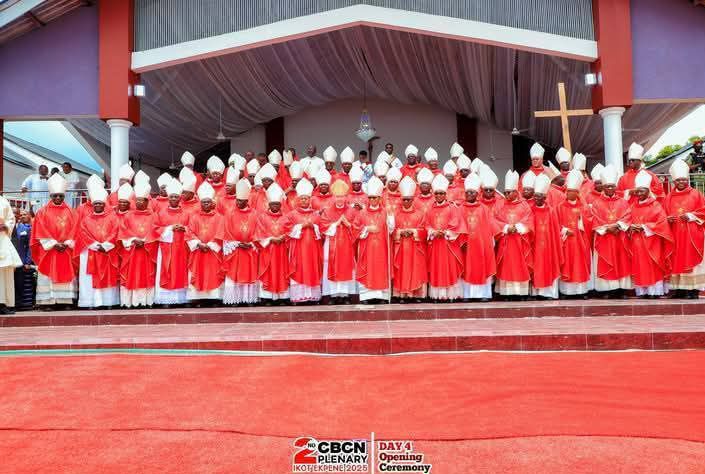
Catholic Bishops Conference of Nigeria (CBCN) has warned that priests who deviate from established liturgical norms betray their sacred duty and lead the faithful astray.
The Church Fathers in a communiqué at the end of their second plenary meeting at Ikot Ekpene, Akwa Ibom State, between September 11 and 19, condemned multiple collections and fund raising in the church, describing them as “direct affront to the sanctity of the sacred liturgy.”
The bishops in the communique signed by the CBCN President, Archbishop Lucius Ugorji, and Secretary, Bishop Donatus Ogun (OSA), noted their earlier communique at the end of second plenary assembly at Auchi Diocese in 2024, and said “these aberrations are sources of scandal that hurt the sensibilities of many devout Catholics.”
The leaders called on bishops as chief liturgists in their various dioceses to do more to promote, moderate and guide the liturgical life of local churches.
They also expressed worry over the practice of allowing politicians to use the sanctuary during liturgical worship.
“Very often, such opportunities are misused for mundane and self-serving purposes,” the bishops said, pointing out that the “Church is not just any building; it is a sacred space with its sanctity respected.”
CBCN regretted that some religious leaders see religion as a means of achieving instant material well-being or obtaining healing and security.
The situation, according to the conference, is further “compounded by the emergence of many charlatans, owners of so-called private ministries and preachers of prosperity gospel who masquerade as modern-day prophets and evangelists.”
They added that in the absence of effective regulations and oversight structures, “these ministries operate with impunity.
“We reiterate our appeal to Diocesan Bishops and Major Superiors to stand strongly against these unorthodox practices and remind their subordinates of the importance of unwavering fidelity to our Catholic doctrines and practice.”
The conference stressed the need for teaching of catechism, which it described as, not only vital “for fostering deep communion with Jesus Christ,” but also provides “clear and systematic teaching of Catholic doctrine, and forming lifelong faithful disciples who can live out their faith with compassion and truth.
“We, therefore, urge our pastoral agents to engage in teaching catechism, conducting regular instructions and marriage courses, with the aim of explaining the faith to our children, young people and adults.
“We enjoin our priests to prepare and deliver good and impactful homilies.
“These measures will help to teach our people the Christian faith and help them to persevere in the Gospel values.”





